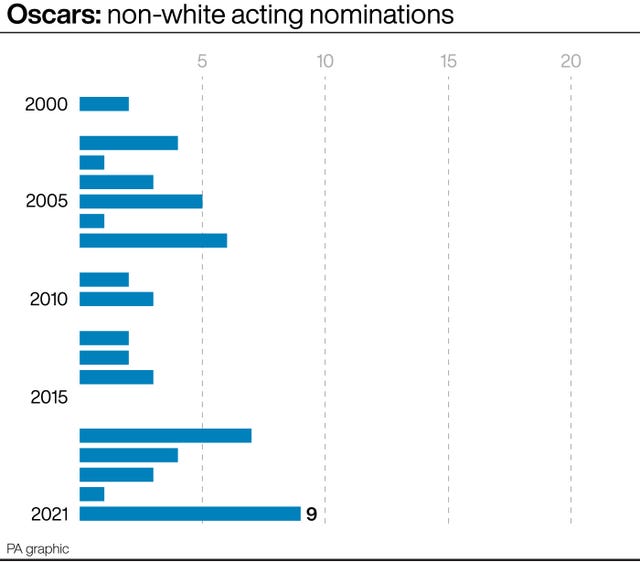The Oscars have unveiled the most ethnically diverse line-up of acting nominations in the 93-year history of the awards.
A total of nine of the 20 acting nominees are non-white, including three of the five nominees in the categories of best actor and best supporting actor.
It is a major turnaround from last year’s nominations, when just one of the 20 nominees was non-white.

This year sees Riz Ahmed (for Sound Of Metal), Chadwick Boseman (Ma Rainey’s Black Bottom) and Steven Yeun (Minari) all nominated for best actor, along with Sir Anthony Hopkins (The Father) and Gary Oldman (Mank).
There is a similar non-white/white split in the supporting actor category, with Daniel Kaluuya (Judas & The Black Messiah), Leslie Odom Jr (One Night In Miami…) and Lakeith Stanfield (Judas & The Black Messiah) all nominated, plus Sacha Baron Cohen (The Trial Of The Chicago 7) and Paul Raci (Sound Of Metal).
The least diverse category is supporting actress, with just one non-white nominee: Yuh-Jung Youn (Minari).
The others are Maria Bakalova (Borat Subsequent Moviefilm), Glenn Close (Hillbilly Elegy), Olivia Colman (The Father) and Amanda Seyfried (Mank).
The best actress category has two non-white nominees: Viola Davis (Ma Rainey’s Black Bottom) and Andra Day (The United States Vs Billie Holiday).
The other nominees are Vanessa Kirby (Pieces Of A Woman), Frances McDormand (Nomadland) and Carey Mulligan (Promising Young Woman).
Before this year, the highest number of non-white acting nominees was seven out of 20, in 2017.
In both 2015 and 2016, there were no non-white performers nominated in any category.
The first non-white performer to win an acting Oscar was Hattie McDaniel, who won best supporting actress in 1940 for Gone With The Wind.
Along with McDaniel, there have been non-white winners in the acting categories a total of 19 times: five for best actor, once for best actress, five for best supporting actor and eight for best supporting actress.
